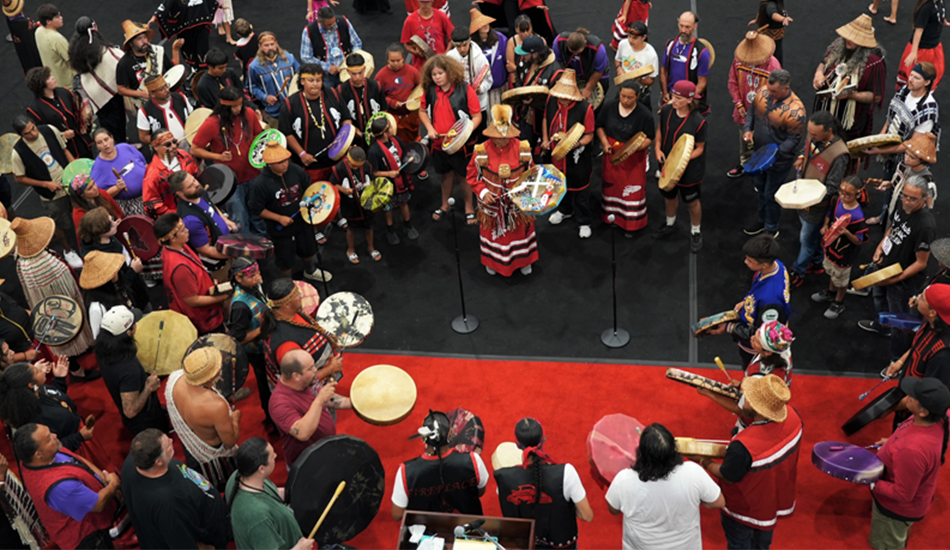By Molly Bryant, Puyallup Tribal News
Canoe Journey returned in late July after being canceled for three years due to COVID. Honoring its host Tribe, the event was named Paddle to Muckleshoot, and the theme was “Honoring our Warriors Past and Present.”
Canoe Families used their traditional mode of transportation to make the journey to the landing at Alki Beach in West Seattle on July 30.
More than 100 canoes crossed ancestral waterways and were greeted by hundreds of thrilled spectators at Alki. Heritage Division Manager Connie McCloud remarked, “It was really exciting. There was a lot of anticipation about being able to go again.”
The Puyallup Canoe Family traveled with two canoes this year, the Wa-he-Lut Warrior and Kwawatee.
Many youth participated in pulling this year. Jarren Moreno, a student at Chief Leschi Schools, was elected to ask permission to Muckleshoot to come ashore. As a part of Protocol, all Canoe Families must respectfully ask the host Tribe for permission to come ashore.
Regarding this year’s journey, he said his main takeaway was self-respect.
“We’re here to be a community and we’re here to uplift each other, and that’s what Journey is kind of all about, is meeting with our relatives while also carrying on our traditions,” said Moreno.
During the journey, pullers usually paddle anywhere from 8 to 10 hours a day. In the Salish Sea, the waters can often be unpredictable, and skippers play an integral role.
Skippers are typically the most experienced pullers in the canoe. They sit in the back and help navigate. Using their wealth of knowledge of the waters and the canoe, they are essential members of the team.
Michael Hall, known to friends and family as “Muck,” is a culture coordinator and carver for the Puyallup Tribe’s Culture Department. He has been involved with Canoe Journey since 2008 and was a skipper this year for the Kwawatee canoe.
Hall said he holds a lot of responsibility as a skipper. “You have to win not only the trust of the water and the canoe but also the people that are getting in the canoe. It’s a high honor to me,” he said.
An important resource to the Canoe Family is the support boat which follows canoes on their journey, offering assistance if there are any complications along the way.
Yell-xla-bate-soot, also known as “Yelkie” Bill, serves as a coordinator assistant for the Puyallup Tribe’s Culture Department. He participated in the Canoe Journey this year by helping on the support boat.
A fisherman by trade, he said, “I know a lot about the currents and tides and wind gusts.”
After the long journeys, Protocol began. Canoe Families from near and far introduce themselves, share traditional songs and dance and exchange gifts. This part of the celebration continued around the clock from July 31 to Aug. 6 this year.
The Canoe Families that traveled from the farthest distance went first and the closest families went toward the end. The Puyallup Canoe family was the last family to do Protocol. They began on August 6 at 1 a.m. and ended around 3 a.m.
They formed a drum circle in the middle of the Muckleshoot Community Center and sang and danced to many songs. It is a way to share culture with the many Canoe Families and Tribes in attendance.
“When we take the floor for Protocol, there are so many thousands of hours that go into it,” said Bill. He added, “It’s an art.”
During Protocol, Canoe Families often dress in their traditional regalia. Culture Department coordinator Denise Reed helped this year to assure everyone went out on the floor in proper regalia.
“My passion is weaving, sewing, and teaching dance regalia because I love making everyone feel and look beautiful. My heart was filled with joy, watching all the little girls and women dancing with pride,” said Reed.
As of now, no Tribe has been determined to host Canoe Journey next year. The next Tribe scheduled to host is the Lower Elwha Klallam Tribe in 2025.





